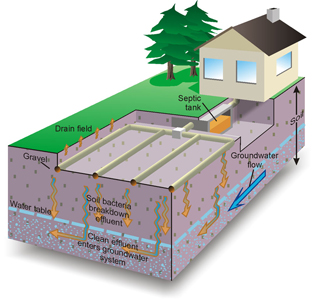Welcome to the Internet! The place where messages spread instantly, regardless of their validity. But, this was happening long before the internet by simple word of mouth. With the wealth of information available circulating, it’s hard to distinguish the facts from myths. This is why we’ve decided to set the record straight on just a few common ideas about septic tanks and systems.
Starting With a New Septic Systems Requires Seeding
What’s seeding? Exactly what it sounds like—helping your system and bacteria grow with “seeds” or in this case organic material. And we have heard of everything under the sun: flushing a pound of yeast, manure, worms and more.
This is a myth! Your septic system does not need your help to get started. Just use the system. Your human waste contains enough “seeding” abilities to get it started. Where the truth does shine a light is keeping your system healthy, especially if you tend to use lots of antibacterial or bleach products. This brings us to our next myth.
Additives Keep Old Systems Running Great
You’ve probably heard the claim…. Have an older system or a system that’s running less than efficient? Just add some additives!
But septic additives working miracles is a myth. Well-balanced septic tanks do not require any help. Many commercially marketed septic products contain corrosive pesticides that will do harm to the bacterial colonies in your system, or turn out to be overpriced yeast (yes, like the stuff used to make bread). If you are having trouble with your system, add some helpful bacteria by putting yogurt, activated yeast, or even some beer down the drain. This is most helpful if your household uses lots of antibacterial and bleach based products —which you shouldn’t, but that’s for another post. These helper bacteria will only help keep a system healthy, so if you’re still having trouble it’s time to bring in a professional for an inspection, pumping, or possible repair.
Pump Your Septic Tank every 5-7 years
An average family can fill a septic tank to operating level in less than a week without altering regular water level use. It’s not needed to pump the septic tank just because it may be full or a certain age. Just let your healthy system do its work. In fact, as long as your tank is sized appropriately to your household and property maintained, your system will be breaking down and processing waste for many years.
However, if a septic tank is full of “sludge” (soil, bones, food particles, etc), solids or is consistently full of liquid that does not drain—it’s time to have your system inspected, pumped or possibly repaired. You should always have your system inspected prior to scheduling a pumping. A good inspector should not need the tank pumped in most cases and will let you know if your system is healthy or needs to be pumped. There are a few instances when you should avoid pumping your tank, but we’ll talk about these on a future blog post.
Once Installed, Septic Tanks Take Care of Themselves
It’s true! With their biological processes and gravity flows, septic systems and tanks do all the work with little help from you. Being buried makes them easily forgettable. While you may not need to take direct actions, your habits will affect the overall health of your septic system.
You’ll Only Need One Septic System
Septic systems do not last a lifetime. On average, systems last 25-30 years with proper care and maintenance.
If you want longevity from your system, knowing the proper maintenance is priority number one. But, sometimes the water is muddied by septic myths.
Understanding which are true and which are nothing but old tales can be confusing. Have questions about some tips you’ve heard? Call Magneson Tractor Service today—we have your answers. Have a troubling myth you want us to get to the bottom of? Send us a message or leave a comment, and we’ll be happy to separate the poo from the fact!


